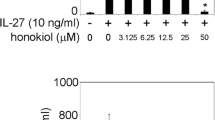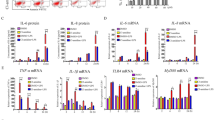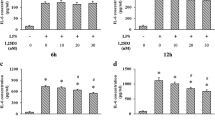Abstract
Carnosic acid, which is a bioactive compound isolated from rosemary, has various pharmacological effects. However, the anti-inflammatory effect of carnosic acid on periodontitis is still unknown. The aim of this study was to investigate the effect of carnosic acid on CXC chemokine receptor 3 (CXCR3) ligands, which are involved in Th1 cells migration and accumulation, production in interleukin (IL)-27-stimulated human oral epithelial cells (TR146 cells). Carnosic acid decreased CXC chemokine ligand (CXCL)9, CXCL10, and CXCL11 production in IL-27-stimulated TR146 cells in a dose-dependent fashion. Moreover, we disclosed that carnosic acid could suppress signal transducer and activator of transcription (STAT)1, STAT3, and protein kinase B (Akt) phosphorylation in IL-27-stimulated TR146 cells. Furthermore, STAT1, STAT3, and Akt inhibitors could suppress CXCR3 ligands production in IL-27-treated TR146 cells. In summary, carnosic acid could reduce CXCR3 ligands production in human oral epithelial cell by inhibiting STAT1, STAT3, and Akt activation.



Similar content being viewed by others
References
Page, R.C. 1991. The role of inflammatory mediators in the pathogenesis of periodontal disease. Journal of Periodontal Research 26: 230–242.
Kawai, T., R. Eisen-Lev, M. Seki, J.W. Eastcott, M.E. Wilson, and M.A. Taubman. 2000. Requirement of B7 costimulation for Th1-mediated inflammatory bone resorption in experimental periodontal disease. Journal of Immunology 64: 2102–2109.
Zhang, X., and Y.T. Teng. 2006. Interleukin-10 inhibits gram-negative-microbe-specific human receptor activator of NF-kappaB ligand-positive CD4+-Th1-cell-associated alveolar bone loss in vivo. Infection and Immunity 74: 4927–4931.
Hienz, S.A., S. Paliwal, and S. Ivanovski. 2015. Mechanisms of bone resorption in periodontitis. Journal of Immunology Research 2015: 615486.
Heise, C.E., A. Pahuja, S.C. Hudson, M.S. Mistry, A.L. Putnam, M.M. Gross, P.A. Gottlieb, W.S. Wade, M. Kiankarimi, D. Schwarz, P. Crowe, A. Zlotnik, and D.G. Alleva. 2005. Pharmacological characterization of CXC chemokine receptor 3 ligands and a small molecule antagonist. The Journal of Pharmacology and Experimental Therapeutics 313: 1263–1271.
Hosokawa, Y., I. Hosokawa, K. Ozaki, and T. Matsuo. 2017. IL-27 modulates chemokine production in TNF-α -stimulated human oral epithelial cells. Cellular Physiology and Biochemistry 43: 1198–1206.
Thummuri, D., V.G.M. Naidu, and P. Chaudhari. 2017. Carnosic acid attenuates RANKL-induced oxidative stress and osteoclastogenesis via induction of Nrf2 and suppression of NF-κB and MAPK signalling. Journal of Molecular Medicine 95: 1065–1076.
Vázquez, N.M., G. Fiorilli, P.A. Cáceres Guido, and S. Moreno. 2016. Carnosic acid acts synergistically with gentamicin in killing methicillin-resistant Staphylococcus aureus clinical isolates. Phytomedicine. 23: 1337–1343.
Su, K., C.F. Wang, Y. Zhang, Y.J. Cai, Y.Y. Zhang, and Q. Zhao. 2016. The inhibitory effects of carnosic acid on cervical cancer cells growth by promoting apoptosis via ROS-regulated signaling pathway. Biomedicine & Pharmacotherapy 82: 180–191.
Gaya, M., V. Repetto, J. Toneatto, C. Anesini, G. Piwien-Pilipuk, and S. Moreno. 2013. Antiadipogenic effect of carnosic acid, a natural compound present in Rosmarinus officinalis, is exerted through the C/EBPs and PPARγ pathways at the onset of the differentiation program. Biochimica et Biophysica Acta 1830: 3796–3806.
Jacobsen, J., E.B. Nielsen, K. Brøndum-Nielsen, M.E. Christensen, H.B. Olin, N. Tommerup, and M.R. Rassing. 1999. Filter-grown TR146 cells as an in vitro model of human buccal epithelial permeability. European Journal of Oral Sciences 107: 138–146.
Garlet, G.P., W. Martins Jr., B.R. Ferreira, C.M. Milanezi, and J.S. Silva. 2003. Patterns of chemokines and chemokine receptors expression in different forms of human periodontal disease. Journal of Periodontal Research 38: 210–217.
Hosokawa, Y., I. Hosokawa, K. Ozaki, and T. Matsuo. 2018. Honokiol and magnolol inhibit CXCL10 and CXCL11 production in IL-27-stimulated human oral epithelial cells. Inflammation 41: 2110–2115.
Hosokawa, Y., I. Hosokawa, K. Ozaki, H. Nakae, and T. Matsuo. 2009 Apr. Cytokines differentially regulate CXCL10 production by interferon-gamma-stimulated or tumor necrosis factor-alpha-stimulated human gingival fibroblasts. Journal of Periodontal Research 44 (2): 225–231.
Hosokawa, Y., I. Hosokawa, K. Ozaki, H. Nakae, and T. Matsuo. 2010. TNFSF14 coordinately enhances CXCL10 and CXCL11 productions from IFN-gamma-stimulated human gingival fibroblasts. Molecular Immunology 47: 666–670.
Hosokawa, Y., I. Hosokawa, K. Ozaki, T. Nakanishi, H. Nakae, and T. Matsuo. 2010 Jul. Catechins inhibit CXCL10 production from oncostatin M-stimulated human gingival fibroblasts. The Journal of Nutritional Biochemistry 21 (7): 659–664.
Liu, M., X. Zhou, L. Zhou, Z. Liu, J. Yuan, J. Cheng, J. Zhao, L. Wu, H. Li, H. Qiu, and J. Xu. 2018. Carnosic acid inhibits inflammation response and joint destruction on osteoclasts, fibroblast-like synoviocytes, and collagen-induced arthritis rats. Journal of Cellular Physiology 233: 6291–6303.
Kida, Y., M. Kobayashi, T. Suzuki, A. Takeshita, Y. Okamatsu, S. Hanazawa, T. Yasui, and K. Hasegawa. 2005. Interleukin-1 stimulates cytokines, prostaglandin E2 and matrix metalloproteinase-1 production via activation of MAPK/AP-1 and NF-kappaB in human gingival fibroblasts. Cytokine. 29: 159–168.
Rizzo, A., N. Bevilacqua, L. Guida, M. Annunziata, C. Romano Carratelli, and R. Paolillo. 2012. Effect of resveratrol and modulation of cytokine production on human periodontal ligament cells. Cytokine. 60: 197–204.
Kim, D.H., K.W. Park, I.G. Chae, J. Kundu, E.H. Kim, J.K. Kundu, and K.S. Chun. 2016. Carnosic acid inhibits STAT3 signaling and induces apoptosis through generation of ROS in human colon cancer HCT116 cells. Molecular Carcinogenesis 55: 1096–1110.
Kar, S., S. Palit, W.B. Ball, and P.K. Das. 2012. Carnosic acid modulates Akt/IKK/NF-κB signaling by PP2A and induces intrinsic and extrinsic pathway mediated apoptosis in human prostate carcinoma PC-3 cells. Apoptosis. 17: 735–747.
Funding
This work was supported by JSPS KAKENHI (Grant Numbers: 16K11834 and 18K09600).
Author information
Authors and Affiliations
Corresponding author
Ethics declarations
Conflict of Interest
The authors declare that they have no conflicts of interest.
Additional information
Publisher’s Note
Springer Nature remains neutral with regard to jurisdictional claims in published maps and institutional affiliations.
Rights and permissions
About this article
Cite this article
Hosokawa, I., Hosokawa, Y., Ozaki, K. et al. Carnosic Acid Inhibits CXCR3 Ligands Production in IL-27-Stimulated Human Oral Epithelial Cells. Inflammation 42, 1311–1316 (2019). https://doi.org/10.1007/s10753-019-00991-6
Published:
Issue Date:
DOI: https://doi.org/10.1007/s10753-019-00991-6




